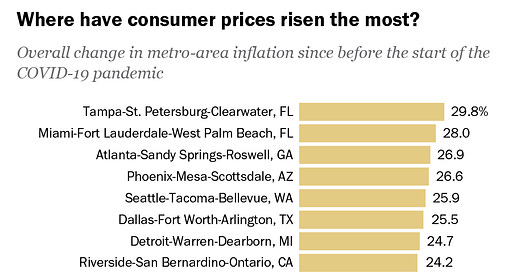“If I could only open one thing each morning it would be John Ellis’s News Items newsletter.” — Larry Summers, President Emeritus of Harvard University and former Secretary of the Treasury of the United States.
1. Angela Colbert, Ph.D., NASA’s Jet Propulsion Laboratory:
Due to global warming, global climate models predict hurricanes will likely cause more intense rainfall and have an increased coastal flood risk due to higher storm surge caused by rising seas. Additionally, the global frequency of storms may decrease or remain unchanged, but hurricanes that form are more likely to become intense.
In a hurricane, spiraling winds draw moist air toward the center, fueling the towering thunderstorms that surround it. As the air continues to warm due to climate change, hurricanes can hold more water vapor, producing more intense rainfall rates in a storm.
Moreover, according to Tom Knutson, senior scientist at NOAA’s Geophysical Fluid Dynamics Laboratory, most models show that climate change brings a slight increase in hurricane wind intensity. This change is likely related to warming ocean temperatures and more moisture in the air, both of which fuel hurricanes. While most models show either no change or a decrease in hurricane frequency in a warmer climate, a greater proportion of the storms that form will reach very intense (Category 4 or 5) levels. In other words, while there may be fewer storms, the ones that form have a greater chance of becoming stronger.
Scientists continue to research these topics along with other important hurricane metrics, including any potential changes in the speed at which hurricanes move across the ocean, how large storms will get, and where hurricanes will go. (Sources: science.nasa.gov-1 June 2022, gfdl.noaa.gov)
2. Weather.com:
Hurricane Milton weakened slightly late Monday night after reaching a near-record minimum low pressure earlier in the afternoon. Milton's peak intensity on Monday ranks among the most intense Atlantic hurricanes on record with wind speeds at or above 180 mph and minimum pressure below 900 mb.
Hurricane and storm surge warnings are now posted along Florida's western Gulf Coast, where the storm will bring life-threatening storm surge, destructive winds and flooding rainfall by midweek.
"If Milton stays on its course, this will be the most powerful hurricane to hit Tampa Bay in over 100 years. No one in the area has ever experienced a hurricane this strong before," warned the National Weather Service in Tampa Bay. (Sources: weathwer.com, x.com/NWSTampaBay)
3. Tampa Mayor Jane Castor: “I can say this without any dramatization whatsoever: If you choose to stay in one of those evacuation areas, you are going to die.” (Sources: x.com, cnn.com)
4. Across much of Florida and especially along the western coast, a surplus of inventory and dwindling buyer interest are slowing sales and keeping homes on the market longer. That is cooling off what had been one of America’s biggest housing booms this decade. Tropical storms and hurricanes, increasingly hitting the state’s western coast, are making matters worse. (S)urging insurance costs, high mortgage rates and high home prices have more people reassessing the Florida dream. Those who must sell their homes right now because of life changes are finding a frosty reception as demand dwindles. (Source: wsj.com)
Public pension systems in the U.S. have seen a significant increase in unfunded liabilities, particularly during the Great Recession. Between 2007 and 2010, unfunded liabilities grew by over $1.11 trillion—a 632% increase—reflecting the financial challenges faced during that period. Despite some improvements in funding ratios over the last decade, these liabilities have continued to rise, underscoring ongoing financial pressures.
As of the end of the 2023 fiscal year for each public pension system, total unfunded public pension liabilities (UAL) reached $1.59 trillion, with state pension plans carrying the majority of the debt.
Keep reading with a 7-day free trial
Subscribe to News Items to keep reading this post and get 7 days of free access to the full post archives.



